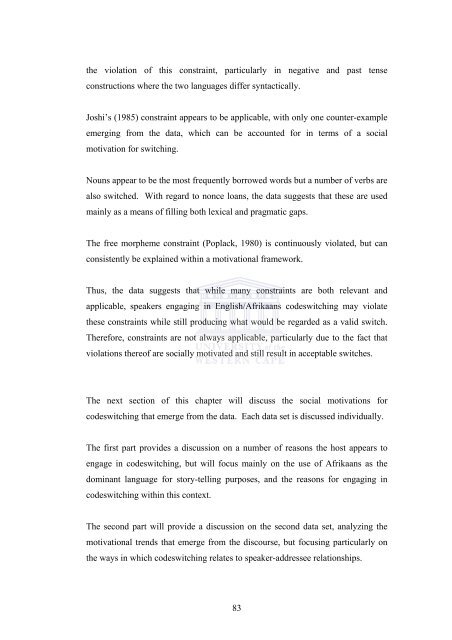grammatical constraints and motivations for - University of the ...
grammatical constraints and motivations for - University of the ...
grammatical constraints and motivations for - University of the ...
Create successful ePaper yourself
Turn your PDF publications into a flip-book with our unique Google optimized e-Paper software.
<strong>the</strong> violation <strong>of</strong> this constraint, particularly in negative <strong>and</strong> past tense<br />
constructions where <strong>the</strong> two languages differ syntactically.<br />
Joshi’s (1985) constraint appears to be applicable, with only one counter-example<br />
emerging from <strong>the</strong> data, which can be accounted <strong>for</strong> in terms <strong>of</strong> a social<br />
motivation <strong>for</strong> switching.<br />
Nouns appear to be <strong>the</strong> most frequently borrowed words but a number <strong>of</strong> verbs are<br />
also switched. With regard to nonce loans, <strong>the</strong> data suggests that <strong>the</strong>se are used<br />
mainly as a means <strong>of</strong> filling both lexical <strong>and</strong> pragmatic gaps.<br />
The free morpheme constraint (Poplack, 1980) is continuously violated, but can<br />
consistently be explained within a motivational framework.<br />
Thus, <strong>the</strong> data suggests that while many <strong>constraints</strong> are both relevant <strong>and</strong><br />
applicable, speakers engaging in English/Afrikaans codeswitching may violate<br />
<strong>the</strong>se <strong>constraints</strong> while still producing what would be regarded as a valid switch.<br />
There<strong>for</strong>e, <strong>constraints</strong> are not always applicable, particularly due to <strong>the</strong> fact that<br />
violations <strong>the</strong>re<strong>of</strong> are socially motivated <strong>and</strong> still result in acceptable switches.<br />
The next section <strong>of</strong> this chapter will discuss <strong>the</strong> social <strong>motivations</strong> <strong>for</strong><br />
codeswitching that emerge from <strong>the</strong> data. Each data set is discussed individually.<br />
The first part provides a discussion on a number <strong>of</strong> reasons <strong>the</strong> host appears to<br />
engage in codeswitching, but will focus mainly on <strong>the</strong> use <strong>of</strong> Afrikaans as <strong>the</strong><br />
dominant language <strong>for</strong> story-telling purposes, <strong>and</strong> <strong>the</strong> reasons <strong>for</strong> engaging in<br />
codeswitching within this context.<br />
The second part will provide a discussion on <strong>the</strong> second data set, analyzing <strong>the</strong><br />
motivational trends that emerge from <strong>the</strong> discourse, but focusing particularly on<br />
<strong>the</strong> ways in which codeswitching relates to speaker-addressee relationships.<br />
83
















